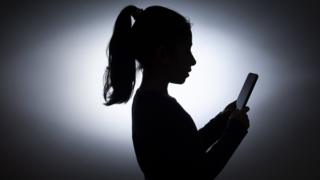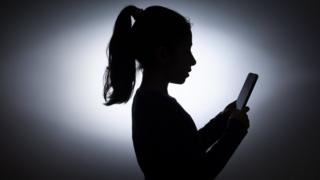County lines: Girls under the radar in drug gangs
How violent gangs put vulnerable young women and girls at “the forefront” of their business. …

 Image copyright Getty Images
Image copyright Getty Images “I’ve had a gun held to my head in country. My friends have been stabbed in country. When you’re in the countryside it’s business, no one’s laughing and joking. We’re here to make money and not get killed.”
Danielle* was 15 when she was kidnapped and raped in London.
She told the police what happened but claimed she didn’t know who attacked her.
She lied because she was scared and so no-one was ever prosecuted.
She was terrified she would be attacked again and, with no family to help her, she turned to a gang on her estate, knowing they could keep her safe.
The group was running county lines all over the country.
‘Dangerous people’
“I wanted to be protected by them. Let me go to the scariest, most dangerous people and fit in with them basically. Nobody, nothing could hurt me when I’m in this group of people.”
County lines is the term used to describe criminal gangs who move illegal drugs from big cities to more rural locations and sell them via dedicated mobile phone lines.
They often use threats and violence to make children and vulnerable adults move and store the drugs, as well as weapons and cash.
The National Crime Agency (NCA) estimates profits from the trade nationwide are around £500m a year.
Danielle became the girlfriend of one of the gang’s senior figures. It was a violent relationship but says she felt safer than being on her own.
Soon she was drawn into their world.
Harder to spot
“I had to make myself useful and my boyfriend at the time, that was what he wanted me to do. I was just prepping the drugs in my house.”
It wasn’t long before her role grew. She was sent to sell heroin and crack in towns and cities far away from London.
Danielle says girls are seen as assets by the drug dealers for helping them avoid detection. It’s harder for police to spot them ‘in country’.
“I was told, ‘You’re small and you’re white so you’re not gonna get stopped,’ which worked for a long time.
“People don’t talk about girls in county line gangs, we’re just hush hush. We’re really in the forefront of these businesses because we fly under the radar, which is why girls are being used.”
Death threats
Danielle says seeing extreme violence became normal and she was often made to carry drugs inside her.
“I had to put that inside me. I didn’t want to do that, it was like forced on me. It’s not pleasant, it hurts.
“I knew in the dark times when I was in my own bed, that this is scary. I didn’t know I was trapped until I tried to leave”.
Danielle says the fear of being seen as a snitch stopped her from getting out sooner.
“That’s why it’s so hard to leave, because you never want to be that girl that’s told the police anything. I never did tell the police anything. There was the threats, death threats for a long time.”
It’s not known just how many girls like Danielle are involved in county lines across the UK.
Lizzie’s* daughter, Cara*, was a normal teenager living in the West Midlands who was into sports and good at English.
But when she was 13 she made friends with a gang of older girls.
“Her appearance started to change, her social friends started to change, her whole behaviour started to change. She was getting into trouble at school, getting excluded and hanging around with people who were stealing,” says Lizzie.
Then she started going missing. The police told Lizzie they were concerned Cara was being groomed and exploited.
On one occasion, she was discovered with an older woman in a flat in Northamptonshire which contained drugs and cash.
She was brought home by police but soon went missing again. Lizzie was terrified.
“You fear that your child could be dead, you just can’t sleep, you can’t think, you can’t focus and it’s high levels of stress.”
Following a police investigation, Cara was eventually found in a flat in Lincoln.
‘Fear of death’
The 14-year-old had been trafficked there by a drug dealer from Birmingham who was running a county line.
She had been made to deliver heroin and crack cocaine night and day, only going out to sell drugs.
Police found her and a teenage boy in the freezing flat surrounded by drugs, syringes and a blooded knife.
“He instilled the fear of death into those children. He had no intention of giving those children anything. They were too frightened even to leave the flat to buy food to eat,” says Lizzie.
The man responsible went on to be prosecuted and jailed for 14 years.
Cara is back living with her mum and going to college but Lizzie says the experience will affect her daughter for life.
“She feared for her own life. Even to this day she’s still not talking about what happened to her. She says people will kill her, they’ll kill me.”
In 2018, London’s Rescue and Response programme was set up to help under-25s caught in the world of county lines.
It recently identified 4,013 individuals from the capital involved in county lines, 10% of whom were female.
One of the organisations which works with girls and young women referred to the Rescue and Response programme is Abianda.
Its chief executive, Abi Billinghurst, told File on 4: “There are a vast number of young women who go unrecognised, under the radar. They’ve always been involved; it’s just nobody’s ever looked under the stone to find out.”
The National County Lines Coordination Centre was set up a year ago to map and disrupt the thousands of county lines operating across the country.
So far it’s safeguarded more than 2,400 vulnerable people, of whom roughly 10 to 15% were girls and young women. And senior police officers in charge expect the numbers to go up.
The government recently pledged £20m to fight county line gangs.
Kit Malthouse MP, the minister for crime and policing, acknowledges government can do more. “Where we know there’s a significant level of vulnerability, I’ll be reviewing all of those programs and seeing whether we need to expand them.”
Danielle was caught with drugs in her 20s and convicted. She finally managed to escape the gang but had to start her life from scratch.
She’s now studying at university and works with a charity called Advance, helping other young women in similar situations.
“I’ve got a passion for helping girls that were like me, because we’re called criminals, we’re arrested.
“Not one police officer said to me, “Are you okay, what’s going on, what’s behind the doors?’ I really want people in power to understand – Don’t let anyone fall through the cracks.”
* Names have been changed to protect identities.
File on 4’s Lost on the line: The county lines gangs recruiting girls is on BBC Radio 4 on Tuesday 15th October at 20:00 BST and available afterwards on BBC Sounds.




